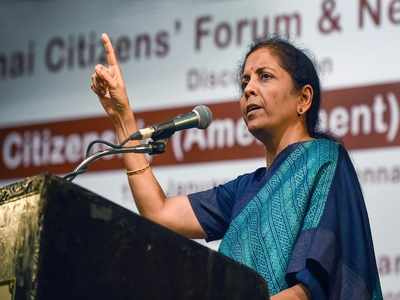
Muslims from Pakistan, Afghanistan & Bangladesh too got .. Can non-India Muslims get citizenship outside of CAA?
 TNN | Jan 20, 2020 |CHENNAI: Pointing out that states cannot refuse to implement the Citizenship (Amendment) Act as “that is against law and the Constitution”, Union finance minister said here on Sunday that as many as 2,838 Pakistanis, 914 Afghans and 172 Bangladeshis had been given citizenship in the past six years.
TNN | Jan 20, 2020 |CHENNAI: Pointing out that states cannot refuse to implement the Citizenship (Amendment) Act as “that is against law and the Constitution”, Union finance minister said here on Sunday that as many as 2,838 Pakistanis, 914 Afghans and 172 Bangladeshis had been given citizenship in the past six years.
Reeling out statistics issued by the Union home ministry, the finance minister added that 391 Afghans and 1,595 Pakistanis had been given citizenship in the past two years. “Obviously, they include Muslims too,” Sitharaman said, while adding that 566 Muslims from Pakistan Afghanistan and Bangladesh were given citizenship since 2014.
Participating in a discussion organised by the Chennai Citizens’ Forum and New India Forum, Sitharaman said, "Political parties can make a political statement by passing resolutions against CAA in the assembly, but states cannot refuse to implement it."
She said there was an attempt by the opposition to distort the truth and create fear about the CAA. “Every question that the opposition raised in Parliament about the CAA was answered…
The CAA is to offer citizenship and not to deny citizenship to anyone,” Sitharaman said.
The Citizenship Act of 1955 continues to remain in force and citizenship will continue to be given to people if they fulfill the conditions under the four categories — birth, descendency, registration and naturalization. “Just by bringing in changes and amendments does not make the existing categories go away,” she pointed out.
Sitharaman said the people who have been granted citizenship are the ones who had come to India from the then East Pakistan, which later became Bangladesh. “People like them had to be given citizenship and hence the amendment to the Citizenship Act,” she said.
She said the condition was very pitiable in camps where Sri Lankan Tamils live. “Political parties raising the issue for not granting citizenship (to Sri Lankan Tamils) will not talk about these. No human rights organisation will speak about them. Since 1964, more than four lakh Sri Lankans have been granted citizenship. Sri Lankan Tamils living in camps, around 95,000 of them, too will be given citizenship in the coming years,” she said.
Clarifying that the CAA had nothing to do with the National Register of Citizens (NRC) and the National Population Register (NPR), Sitharaman said the NRC had been implemented in Assam as per the directions of the Supreme Court. “There have been no talks about the NRC being implemented across India and whether the process will be the same as done in Assam. There have been no talks at all.”
Beyond CAA: Turns out, Muslims from India’s neighbouring countries — Pakistan, Afghanistan and Bangladesh — who feel persecuted or may just have an economic interest in India are entitled to get Indian citizenship.
Finance Minister Nirmala Sitharaman on Sunday disclosed that 391 Afghanistani Muslims were granted Indian citizenship between 2016 and 2018 by the Modi government. Not just that, she added that in the last 6 years, 2,838 Pakistani refugees, 914 Afghanistani refugees and 172 Bangladeshi refugees — including Muslims — were granted Indian citizenship.
Special cases? Sitharaman cited the case of singer Adnan Sami, working as a singer in Bollywood since 2001, who was granted Indian citizenship in 2016 on 'humanitarian' grounds — his Pakistani passport had expired and the government there refused to renew it — though there’s no explanation yet why persecuted Muslims from these three countries can’t be included in the Citizenship (Amendment) Act (CAA). According to the Home Ministry, there were also several Muslims among the 14,864 Bangladeshi nationals who became Indian citizens after the landmark boundary agreement between New Delhi and Dhaka in 2014.
The excluded Hindus: To be fair though, the Home Ministry last year had clarified that Hindus facing religious persecution in any other country — other than Pakistan, Afghanistan and Bangladesh — will not be granted citizenship under the CAA. They will have to apply for Indian citizenship via registration and naturalisation with no special privileges even after the CAA came into being. This explains why the 400 Rohingya Hindus from Myanmar, living as refugees in Bangladesh, have not been covered under the CAA.
Meanwhile, Bangladesh PM Sheikh Hasina also waded into the CAA controversy with a criticism of the Indian government, saying the Act was “not necessary” though she added in the same measure that both the CAA and NRC were “internal matters” of India.


0 Response to "Muslims from Pakistan, Afghanistan & Bangladesh too got .. Can non-India Muslims get citizenship outside of CAA?"
Post a Comment
Disclaimer Note:
The views expressed in the articles published here are solely those of the author and do not necessarily reflect the official policy, position, or perspective of Kalimpong News or KalimNews. Kalimpong News and KalimNews disclaim all liability for the published or posted articles, news, and information and assume no responsibility for the accuracy or validity of the content.
Kalimpong News is a non-profit online news platform managed by KalimNews and operated under the Kalimpong Press Club.
Comment Policy:
We encourage respectful and constructive discussions. Please ensure decency while commenting and register with your email ID to participate.
Note: only a member of this blog may post a comment.